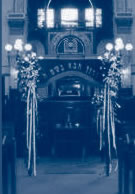|
SEDRA : Mishpatim Shabbat Rosh Chodesh
Hertz Chumash p .306 Exodus Chap. 21 verse 1
This week's Sedra is generously sponsored by Jeff Pura.
SYNOPSIS
Mishpatim - Judgements, introduces a great proportion of
the Torah's legal corpus given at Sinai.
The institution of slavery as understood in the ancient world
is radically reformed into a form of restitution for theft
or 'bankruptcy'.
"Slavery" is indeed an inaccurate translation or
description of a system in which the subject possesses basic
rights to his person, property, family and eventual freedom.
A Jew may be a slave for a maximum of six years. The master
must support a married slave and his Jewish wife & children
during his service. However, a non jewish hand maiden given
him by the master remains with the master.
A slave who insists on remaining in servitude after six years
is to have his ear pierced against the doorpost of the house
and must be freed in the Jubilee Year. A man's daughter sold
into service may be redeemed by relatives if she displeases
her master. If the master's son marries her she is to be treated
as free born. She is entitled to freedom if her husband marries
another woman or if her marital rights are infringed in any
other way. Fatal injury to a slave by the master is a punishable
crime and maiming him leads to immediate freedom.
Capital offences include intentional murder, cursing parents
in the name of G-d, kidnapping, witchcraft, bestiality and
idolatry.
Injury to another leads to liability for the victim's loss
of earnings, medical costs, pain, embarrassment and physical
impairment. Further actions in damages are enacted for injury
to a pregnant woman and the loss of the foetus. Damages caused
by one's animals, property or actions incur liability for
compensation. The method of assessing damages is described.
The laws governing damages or theft to the property of another
held in one's possession in trust, as a deposit, borrowed
or hired are detailed. Theft.
Fines of fivefold and fourfold are enacted for theft and slaughter
of livestock and twofold damages for being found in possession
of stolen livestock. The conditions of justifiable homicide
in robberies are set out.
Laws of Morality and regulations against oppression are legislated.
Wronging the stranger (convert), orphans, widows or anyone
who is vulnerable will invite G-d's anger. Oppression in business,
especially of the underdog is forbidden. The perversion of
justice through false evidence, biased judgement and bribery
is viewed as the greatest danger to the survival of a civilised
society.
Assistance to one's fellow, even a rival, is a sacred obligation.
Lost property must be restored to the owner. Animals must
not be caused or allowed to suffer. This applies especially
to beasts of burden.
First fruits and first born animals are to be dedicated to
G-d.
Other laws include the prohibition of Trefah (meat of an
animal torn by beasts). During the Sabbatical year sowing
and reaping of the land is forbidden.
Shabbat abstention from work is to be observed by all members
of the household, including animals. Pilgrimage to the Sanctuary
by every adult Israelite three times a year on Pesach, Shavuot
and Succot to bring offerings is decreed. It is forbidden
to seethe a kid in it mother's milk. Hashem's assistance in
the conquest and settlement of the land is promised in return
for faithful adherence to all these laws.
Moses descended from Mt Sinai having written down all the
precepts conveyed to him by G-d, offered up sacrifices and
read the Book of the Covenant to the people who instantly
committed themselves to it : "All that G-d has spoken
we will do and we will hearten". After witnessing a mystical
vision of the Divine Glory together with Aaron, Nadav, Avihu
and the seventy Elders, Moses is summoned to ascend Mt Sinai
alone to receive the Tablets of Stone.
SPECIAL MAPHTIR - SHABBAT ROSH CHODESH HERTZ CHUMASH P.
695 Numbers Chap. 28 verses 9 - 15 inc.
HAPHTORAH - FOR SHABBAT ROSH CHODESH HERTZ CHUMASH P.
944 Isaiah Chapter 66
The final chapter of Isaiah comprises the reading when Shabbat
and Rosh Chodesh coincide owing to its reference in the penultimate
verse to the continued and ever more popular observance of
Rosh Chodesh in the future.
The chapter combines fierce admonition for those who pervert
sincere observance, mock the ways of G-d and worship idolatry
while it also describes the rebirth of Israel and the ingathering
of exiles.
The penultimate verse referring to Rosh Chodesh is repeated
again after the conclusion of the Haphtorah.
TELL ME RABBI ..... HALLEL: HYMNS OF PRAISE WHEN HALLEL
IS SAID :
Six psalms (113 -118), collectively known as Hallel (Hymns
of Praise), are said immediately following the Shacharit Amidah
on Pesach, Shavuot, Succot, Channukah and on Rosh Chodesh.
The beauty of these Psalms remains unsurpassed. Not wanting
to leave G-d's praises to chance, the Sages made these psalms
a mitzvah for the festivals. Some regard Hallel on these festivals
as a Torah obligation.
Hymns of praise to G-d are to be said whenever we celebrate
events that commemorate the deliverance of our people from
dire peril (Pesahim 117a) e.g. on Channukah, the ruling of
the Israeli Chief Rabbinate for saying Hallel on Yom Ha'atzmaut
and Yom Yerushalayim.
The joyous mood and tempo of Hallel make it most appropriate
for festivals and for days of national rejoicing. Its music
reflects high spirits and exuberance: "This is the day
which the Lord G-d made, we will be glad and rejoice therein"
(Psalm 118).
HOW HALLEL IS SAID:
Hallel is preceded by the recitation of a blessing. Maimonides
ruled that since Hallel on Rosh Chodesh is only a custom one
omits the blessing as one does not recite a blessing over
a custom (Hil. Hanukkah 3:7).
This is adhered to by Sephardim but Ashkenazim do recite a
blessing even on Rosh Chodesh. It became customary also to
conclude Hallel with a blessing ending with, "...Blessed
art Thou, Lord, a King extolled in psalms of praise."
We stand when reciting Hallel because it is a testimony to
G-d's wondrous deeds and powers, and because testimony in
Jewish courts is always given while standing. Also, it is
in keeping with the verses: "Give praise, ye servants
to the Lord; you who stand in the house of the Lord"
(Psalms 135: 1-2).
BACK TO SHABBAT SHALOM
TABLE
|








